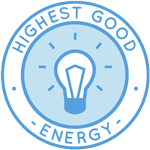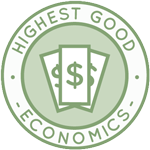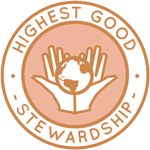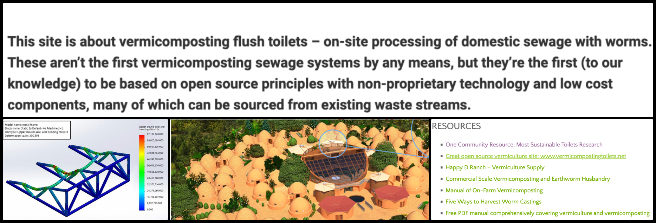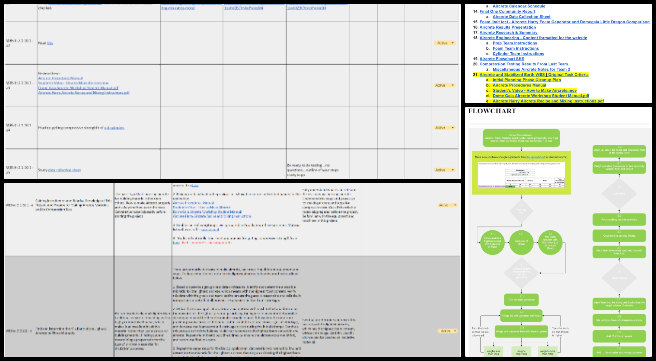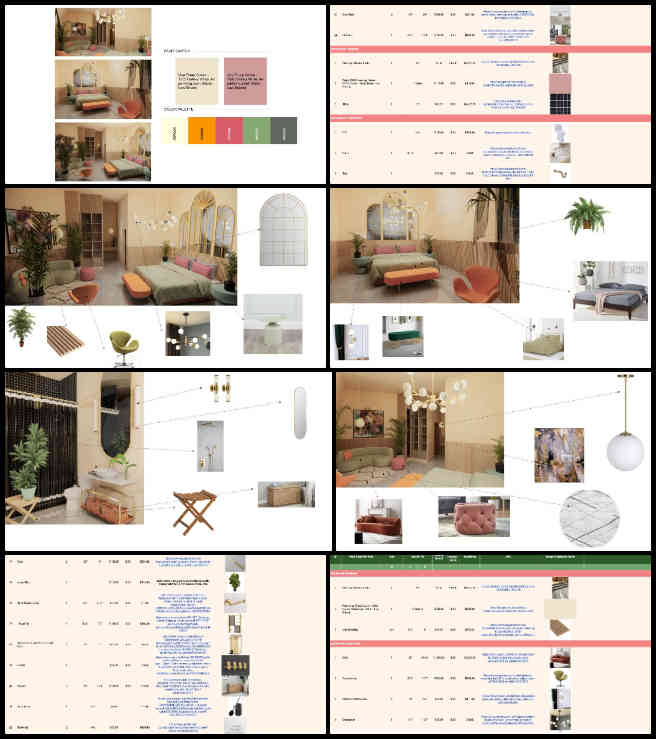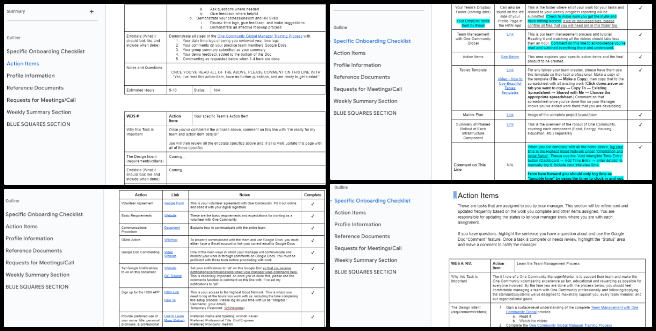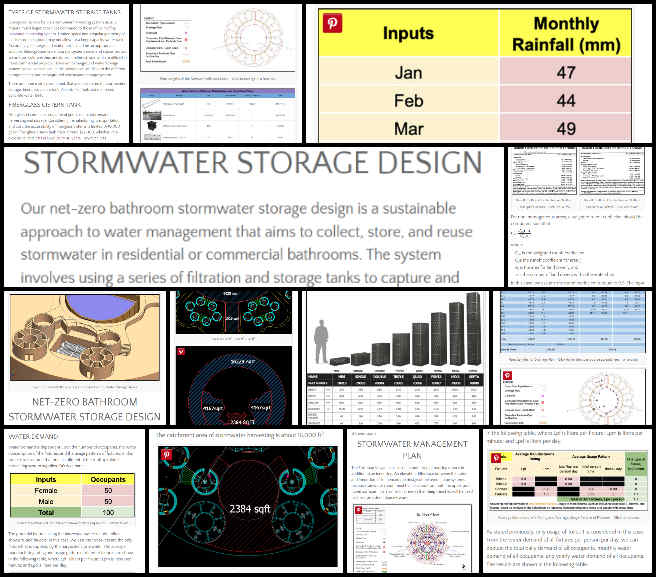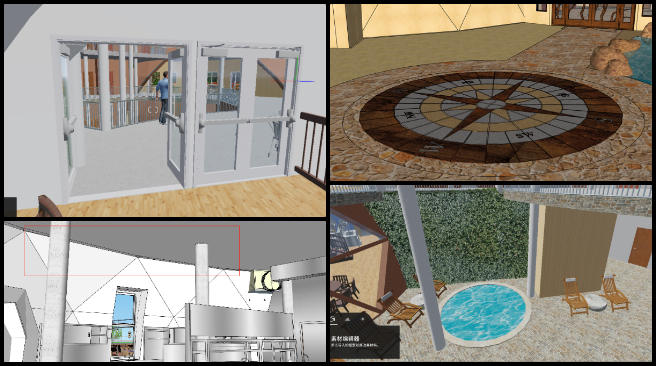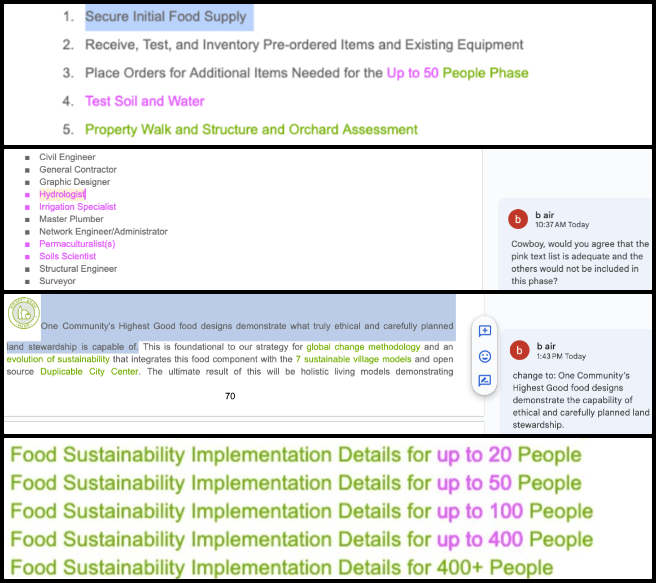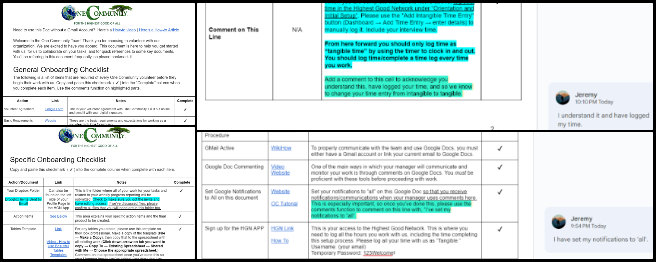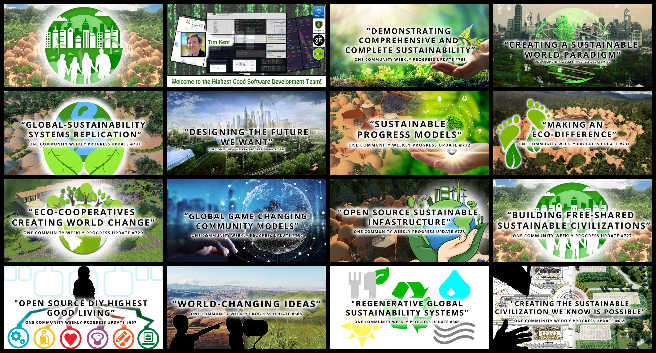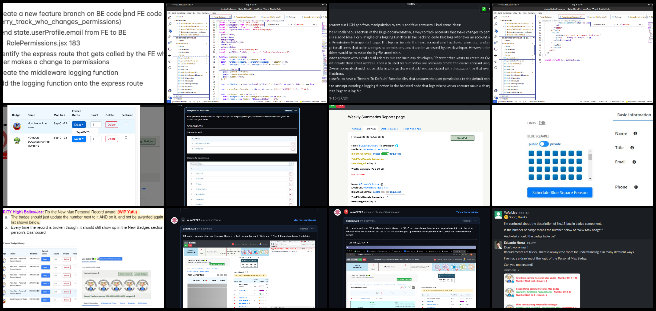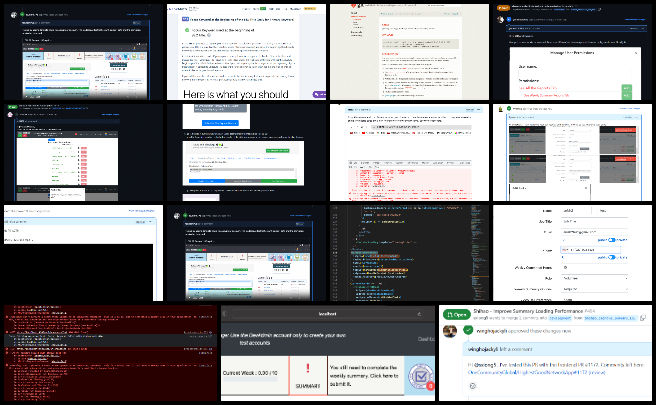Soil Creation Systems – One Community Weekly Progress Update #546
At One Community, we are dedicated to cultivating a world that operates harmoniously on sustainable approaches to food, energy, housing, education, for-profit and non-profit economic design, social architecture, fulfilled living, global stewardship practices, and more. Soil creation systems are integral to this endeavor, playing a vital role in the overall health of our planet. We are pioneering systems like these and more as part of evolving sustainability into a self-replicating model. Our vision extends beyond individual projects; we are establishing a global collaboration of teacher/demonstration hubs that work together to regenerate our planet and create a world that benefits everyone.
- Here’s our soil creation systems project overview
- Here’s our world-change soil creation systems methodology
- Here’s how this becomes self-replicating
- Here’s how we are open source and free-sharing all the do-it-yourself designs
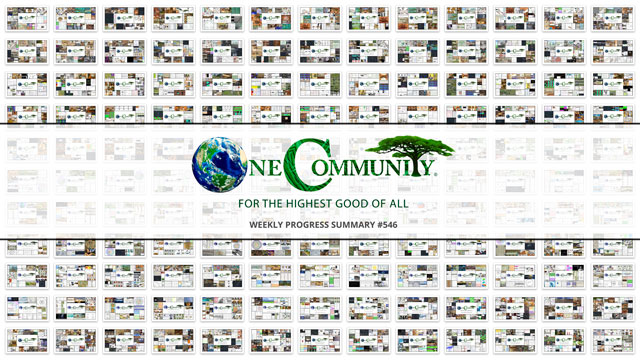
OUR MAIN OPEN SOURCE HUBS
Click on each icon to be taken to the corresponding Highest Good hub page.
One Community’s physical location will forward this soil creation systems movement as the first of many self-replicating teacher/demonstration communities, villages, and cities to be built around the world. This is the September 4th, 2023 edition (#546) of our weekly progress update detailing our team’s development and accomplishments:
Soil Creation Systems
One Community Progress Update #546
DONATE | COLLABORATE | HELP WITH LARGE-SCALE FUNDING
CLICK HERE IF YOU’D LIKE TO RECEIVE AN EMAIL EACH WEEK WHEN WE RELEASE A NEW UPDATE
YOU CAN ALSO JOIN US THROUGH SOCIAL MEDIA
SOIL CREATION SYSTEMS
ONE COMMUNITY WEEKLY UPDATE DETAILS
SOIL CREATION SYSTEMS
HIGHEST GOOD HOUSING PROGRESS
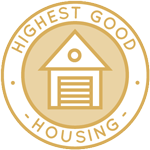 One Community is building soil creation systems through Highest Good housing that is artistic and beautiful, more affordable, more space efficient, lasts longer, DIY buildable, and constructed with healthy and sustainable materials:
One Community is building soil creation systems through Highest Good housing that is artistic and beautiful, more affordable, more space efficient, lasts longer, DIY buildable, and constructed with healthy and sustainable materials:
- Learn about soil creation systems: Our Upcoming Crowdfunding Campaign
- Learn about the different soil creation systems village models: 7 Sustainable Village Models
- Visit the open source portals for the first two: Earthbag Village OS Hub | Straw Bale Village OS Hub
This week, Chris Cullen (Mechanical Engineer) began learning what he needed to help manage development of the Vermiculture Bathroom Designs. Chris successfully conducted a comprehensive review of the web page, focusing on its clarification of vermiculture toilet system functionality and provision of construction details, including mechanical concepts, structural analysis results, and a material cost summary of soil creation systems. See below for the pictures.
Julia Meaney (Research and Web design) completed another week of assisting with research and web design. Julia successfully completed her tasks related to the “Door and Window Research” project. She conducted a comprehensive review of the “Murphy Bed Instructions” PDF, checking the integration of her feedback and addressing comments. Following this, she dedicated her efforts to the “Door and Window Research” Google Doc and its corresponding Spreadsheets, thoroughly scrutinizing Philip’s incorporation of her final feedback. She executed essential final formatting adjustments and content refinements while enhancing the document’s clarity for seamless site integration.
Julia then focused on finalizing updates to the “Duplicable City Center Engineering” webpage, conducting a meticulous examination of equations, and cross-referencing with the source Google Doc to ensure precision of soil creation systems. Subsequently, she made requisite format and content enhancements, along with the replacement of equation images with updated screenshots for improved clarity and legibility. Additionally, Julia expended substantial effort on the “Net-zero Bathroom and Earthbag Village Water Collection and Septic Design EDITED CONTENT FOR WEB” Google Doc, aiming to prepare it for seamless site integration of soil creation systems.
She utilized comments to provide guidance on headings, tables of content, and other soil creation systems elements to enhance web clarity. She diligently addressed unfinished sections, effecting grammar, format, and organizational improvements to enhance overall content structure and flow, with ongoing follow-ups on clarifying questions as needed. See the pictures below.
Loza Ayehutsega (Civil Engineer/Assistant Civil Engineer) completed another week of assisting with Earth Dam Design and construction for Water Retention, Pond, and lake Creation . She provided essential insights by delivering soil creation systems basic inspection guidelines pertaining to embankment dam safety. These guidelines encompass a detailed breakdown of potential failure mechanisms and their corresponding consequences, offering crucial information for the assessment of embankment upstream slopes.
This meticulous examination is of paramount importance in ensuring the structural stability and safety of various water retention systems, including dams and levees. Loza’s report also included soil creation systems, recommended actions, contributing to the proactive management and maintenance of these critical structures. Take a look at the pictures below to get a glimpse of this work.
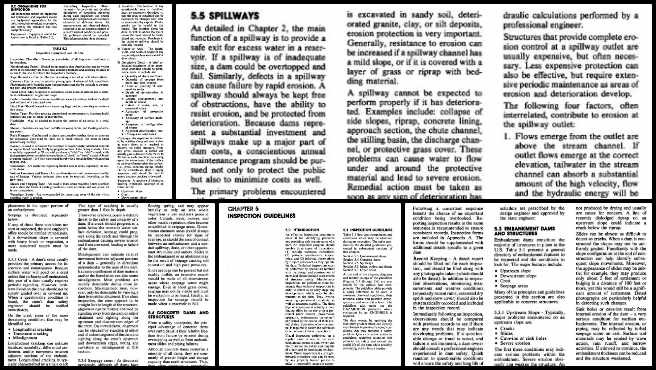
Yiwei He (Mechanical Engineer) completed a week of assisting with Aircrete Engineering. Yiwei dedicated her efforts to reviewing the new Aircrete team’s onboarding materials, meticulously ensuring the provision of accurate and comprehensive information crucial for their upcoming soil creation systems experiments. In addition to this, she actively participated in an interview with a prospective team member, offering an informative overview of project details. See some of this work in the pictures below.
SOIL CREATION SYSTEMS
DUPLICABLE CITY CENTER PROGRESS
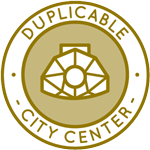 One Community is building soil creation systems through a Duplicable and Sustainable City Center that is LEED Platinum certified/Sustainable, can feed 200 people at a time, provide laundry for over 300 people, is beautiful, spacious, and saves resources, money, and space:
One Community is building soil creation systems through a Duplicable and Sustainable City Center that is LEED Platinum certified/Sustainable, can feed 200 people at a time, provide laundry for over 300 people, is beautiful, spacious, and saves resources, money, and space:
- Learn about building soil creation systems and it’s function: Duplicable City Center Open Source Hub
This week, Amiti Singh (Architectural Designer) completed the soil creation systems design and modeling of a visitor room for the Duplicable City Center. Amiti advanced in the development of Room 4, also referred to as Retro Vogue, within the Duplicable City Center. Her soil creation systems design concept was inspired by the retro vogue of the Renaissance era, and she successfully crafted a comprehensive slide presentation encompassing furniture selection, renders, a carefully curated color palette, and a texture palette, ultimately culminating in the creation of an interior mood board.
Additionally, Amiti diligently wrapped up a detailed cost analysis for the execution of both the room and bathroom components of Room 4, contributing valuable insights to the project. See below for the picture.
Arvindh Xavier (Civil Engineer) prepared himself for managing and helping develop the Duplicable City Center. Arvindh successfully completed the soil creation systems for One Community Orientation and Initial Setup, which encompassed the onboarding checklist, tutorials, and instructional videos crucial to the team management process. He diligently fulfilled the “Learn the Team Management” action item as part of the One Community Global Manager Training. See below for the pictures.
Charles Gooley (Web Designer) completed another week of assisting with web design. Charles dedicated his efforts to a specific section of the soil creation systems and Water Conservation page, originally designated for the Water Recycling Net-zero Bathroom page but subsequently relocated in alignment with clarified project requirements. His tasks involved in-depth discussions encompassing various facets, including the Earthbag Stormwater Harvesting Design, rainfall supply analysis, water demand assessment, catchment area delineation, storage capacity assessments, and sizing soil creation systems considerations for both inlet peak flow discharges and pipe sizing.
Furthermore, Charles made significant contributions to the design of the Net-Zero Bathroom Stormwater Storage, emphasizing an environmentally sustainable approach aimed at the collection, storage, and reuse of stormwater within residential or commercial bathroom settings. This section also provided a comprehensive overview of soil creation systems and different types of storm water storage tanks. The pictures below offer a visual representation of this work.
Julio Marín Bustillos (Mechanical Engineer) completed another week of assisting with the City Center Dome Hub Connector Engineering. Julio continued advancing the intricate process of designing hub connectors for the fourth row, resulting in notable progress with the successful realization of several additional designs. Looking ahead, the upcoming week promises to be another phase of continued design work, with Julio maintaining his steadfast focus in this endeavor.
Furthermore, the commitment to soil creation systems design excellence extends beyond individual efforts, as Julio prepares to update these designs for scrutiny by both Yiwei and Justin. Justin, the newest addition to the team, is poised to play a pivotal role by providing invaluable feedback and conducting crucial simulations. The pictures below provide a glimpse of the images.
Ranran Zhang (Architectural Design) completed another week working on the updated video for the Duplicable City Center internal and external walkthrough soil creation systems. Ranran diligently addressed feedback from the previous week by making essential adjustments to the Lumion and SketchUp models. Her focus was on resolving issues, including the floating compass situated in front of the front door and rectifying overlapping ceiling elements within the kitchen area. Additionally, Ranran ensured the proper adjustment of the area where a person walks through a closed door on the second floor, successfully achieving soil creation systems texture matching between the doors and the wall texture. Take a look at the images below to see some of the progress made in this work.
SOIL CREATION SYSTEMS
HIGHEST GOOD FOOD PROGRESS
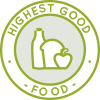 One Community is building soil creation systems through Highest Good food that is more diverse, more nutritious, locally grown and sustainable, and part of our open source botanical garden model to support and share bio-diversity:
One Community is building soil creation systems through Highest Good food that is more diverse, more nutritious, locally grown and sustainable, and part of our open source botanical garden model to support and share bio-diversity:
- Learn about the soil creation systems structures: Hoop House Hub | Aquapini & Walipini Open Source Hub
- See what we’ll be growing: Gardens & Hoop Houses | Large-scale Structures | Food Forest | TA
This week, the core team continued our review of the soil creation systems and open-source Highest Good Food designs. We focused on the ongoing edits and reviews of the Food Rollout Infrastructure Doc. The primary aim of these edits was to refine the entries previously posted on the One Community website, particularly those related to the tasks and details of the initial group of three and the Up to 20 people segments. To enhance clarity and precision, we made necessary adjustments by replacing the previous soil creation systems range factor titles with “UP TO” designations for each group. See the pictures below that are related to this.
And, Shengguang Jin (Mechanical Engineer) completed the work of assisting with Highest Good Food, focusing on thoroughly reading through the relevant information available in shared Google Docs, which comprehensively covers all aspects of the soil creation systems project at both microscopic and macroscopic levels. See the images below for some of his work.
SOIL CREATION SYSTEMS
HIGHEST GOOD EDUCATION PROGRESS
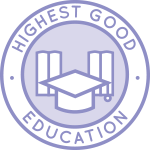 One Community is building soil creation systems through Highest Good education that is for all ages, applicable in any environment, adaptable to individual needs, far exceeds traditional education standards, and more fun for both the teachers and the students. This component of One Community is about 95% complete with only the Open Source School Licensing and Ultimate Classroom construction and assembly details remaining to be finished. We’ll report on the final two elements to be finished as we develop them.
One Community is building soil creation systems through Highest Good education that is for all ages, applicable in any environment, adaptable to individual needs, far exceeds traditional education standards, and more fun for both the teachers and the students. This component of One Community is about 95% complete with only the Open Source School Licensing and Ultimate Classroom construction and assembly details remaining to be finished. We’ll report on the final two elements to be finished as we develop them.
With over 8 years of work invested in the soil creation systems process, the sections below are all complete until we move onto the property and continue the development and open sourcing process with teachers and students – a development process that is built directly into the structure of the education program and everything else we’re creating too:
- Program Overview: Education Open Source Hub
- How the soil creation systems components work together: How to use the Education for Life Program
- Lesson Plans for Life – Lesson Plans How-to
- Foundations of Outstanding Leaders, Teachers, and Communicators
- Curriculum for Life
- Teaching Strategies for Life
- Learning Tools and Toys for Life
- Evaluation and Evolution
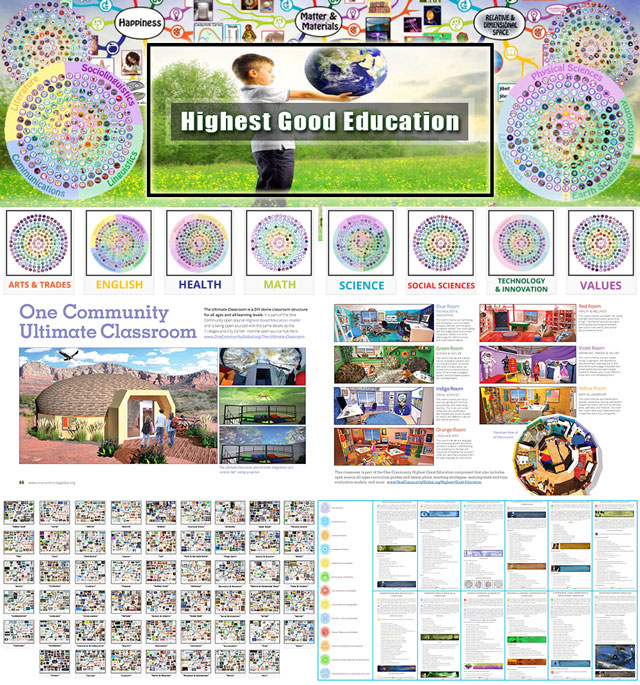
Highest Good Education: All Subjects | All Learning Levels | Any Age – Click image for the open source hub
SOIL CREATION SYSTEMS
HIGHEST GOOD SOCIETY PROGRESS
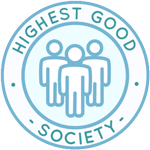 One Community is building soil creation systems through a Highest Good society approach to living that is founded on fulfilled living, the study of meeting human needs, Community, and making a difference in the world:
One Community is building soil creation systems through a Highest Good society approach to living that is founded on fulfilled living, the study of meeting human needs, Community, and making a difference in the world:
- Read the Highest Good society overview: Highest Good Society
- Learn about the soil creation systems model for fulfilled living and sharing: A Day in the Life
- Learn about the 4 economic models: RBE | For-profit | Non-profit | Entrepreneurship
- Learn about our open source community collaboration and management software: The Highest Good Network
This week, the core team completed 73 hours managing One Community volunteer-work review not included above, emails, social media accounts, web development, new bug identification and bug-fix integration for the Highest Good Network software, and interviewing and getting set up new volunteer team members. The pictures below show some of this work.
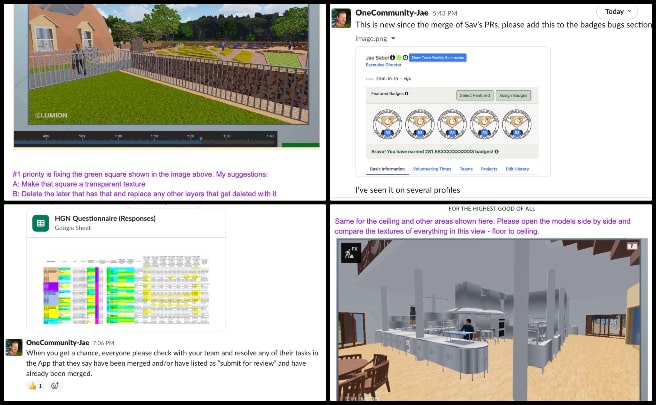
Another core team member conducted soil creation systems HGN PRs testing, meticulously reviewing and assessing several pull requests. Those that were marked as fixed include PRs addressing the issue of an incorrect number of new badges assigned in the upper right corner icon of the Dashboard and another seven PRs. However, certain soil creation systems issues remained unresolved, including the bug where users can save summaries with fewer than 50 words after initially typing more (noted as “Tested Bug”), as well as PR 1040, which could not be fully tested due to new bugs.
Additionally, she facilitated communication with a volunteer regarding PR#1084, which produced console warnings during login, reported a new bug pertaining to difficulties in adding a new WBS for admin users (as owners can do), and flagged another issue concerning password resets for accounts from the list without utilizing the Search engine. See the image below to view this work.
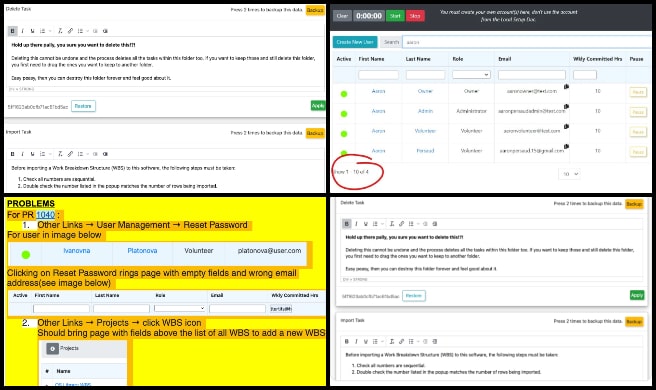
Ray Lee (Digital Creator) also helped create a custom badge that will be awarded to the best debugging people on the Highest Good Network. He also created a header image for the Highest Good Network Phase 2 survey we have new hires complete. The pictures below show these new creations.
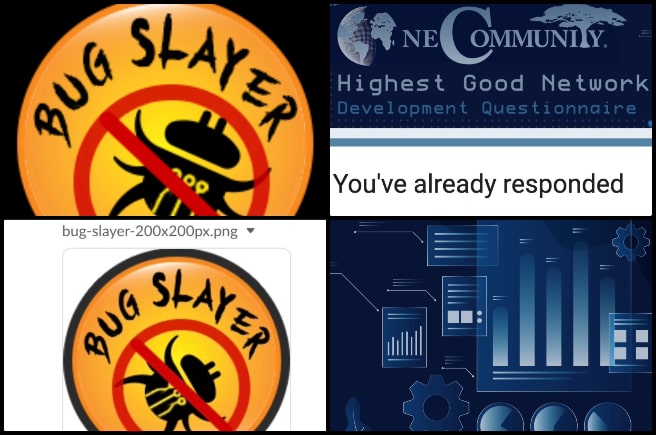
SOIL CREATION SYSTEMS
ADMINISTRATION TEAM
This week, the Administration Team’s summary, covering their work administrating and managing most of One Community, was managed by Jamie and includes Alyx Parr (Senior Support Specialist and Manager), Anitta George Kunnappilly (Research and Management Volunteer), Jamie Cruz (Administrative Assistant and Team Manager), and Olawunmi “Ola” Ijisesan (Administrative and Management Support). Alyx worked on creating collages that were originally missed for blog posts numbered 543, 544, and 545, unzipping numerous folders, transferring summaries, and crafting visually engaging collages, while also preparing the groundwork for soil creation systems blog post 546.
Simultaneously, Anitta completed the PR review for both blog posts 545 and 546, ensuring the team was informed about updated PR protocols and expanding the HGN PR tracking spreadsheet with new members and current information updates. Jamie exhibited exceptional efficiency in concluding her blog project, addressing last-minute details such as refining link titles and actively contributing to the team’s success by providing valuable feedback to fellow team members.
Notably, Jamie took on the responsibility of creating an instructional video to aid Nazia in mastering collage creation, file management, and Dropbox image integration. Throughout the week, Ola demonstrated an unwavering commitment to a wide range of responsibilities within the team, including reviewing the weekly report for Highest Good Network summaries, organizing image uploads into designated folders, crafting visually appealing image collages, editing content, publishing collages on the soil creation systems blog, assessing team member contributions, and providing valuable insights and feedback. The collage below shows some of this work.

SOIL CREATION SYSTEMS
BLUE STEEL SOFTWARE DEVELOPMENT TEAM
This week, the Blue Steel Team’s summary, covering their work on the Highest Good Network software, was managed by Nathan Hoffman and includes Haohui Lin (Software Engineer), Kurtis Ivey (Full Stack Developer), Lucile Tronczyk (Full Stack Software Developer), Nathan Hoffman (Software Engineer and Team Manager), Oleksandr Riazantsev (Project Management Advisor), and Yubo Sun (Full Stack Software Developer). The team members were actively engaged in various aspects of the soil creation systems project.
Nathan worked diligently on resolving issues and implementing improvements, creating PRs 493 and 1201 to address an account reverting bug and dismissing an old review on PR 358. They also tackled inconsistencies in the main bug fix and performed tasks like removing extra roles in the database, debugging the Permissions Management Page reset, and updating permissions. Kurtis focused on backend fixes and PR reviews, although some of his fixes became obsolete due to frontend adjustments. Haohui conducted thorough PR reviews, emphasizing Frontend PR#1045 and Backend PR#482. Oleksandr established a backend hierarchy with specific access permissions and assisted in testing permissions changes for owners.
Xiao Wang addressed critical issues with the weekly summaries page not loading correctly for volunteer users and began investigating the new timer feature. Lucile worked on adding explanatory “i” icons to project elements and improving documentation. Yubo diligently maintained PR #1182 and #1147, performed end-of-week soil creation systems reviews, and planned to evaluate PR #1167 while also considering the implementation of a warning popup for modifying admin links. Each team member contributed significantly to the project’s progress during the week. See the image below to view this work.
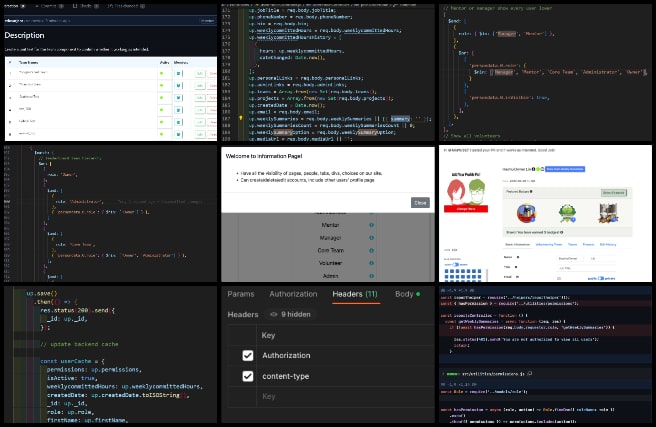
SOIL CREATION SYSTEMS
EXPRESSERS SOFTWARE DEVELOPMENT TEAM
Expressers Team’s summary this week, covering their work on the Highest Good Network software, was managed by Tim Kent (Full Stack Software Engineer and Team Manager) and includes Veronica Cheng (Software Engineer), Yuri Andrade (Software Engineer), Joyce Liu (Software Engineer), and Aaron Persaud (Software Developer). Veronica conducted pull request reviews for tasks #1177, #1210, and #1203, with plans to continue pull request reviews and explore bug-fixing opportunities from the phase I bugs document.
Yuri actively engaged in multiple code reviews for various pull requests (PR1185, PR1183, PR1189, PR1200, PR1999, PR1024, PR1216) in the HGN Software, addressing issues ranging from team alerts and time log formats to dashboard links and app crashes due to duplicate permissions. Joyce focused on enhancing unit tests for the HGN app, conducting QA testing in the development environment, and monitoring the #urgent-bugs-needs-all-help channel for potential tasks, alongside reviewing phase 2 documentation.
Aaron addressed a “Reports” dropdown issue, resolved linting problems, and investigated and temporarily resolved a critical bug causing summaries to display inaccurately. Lastly, Tim researched the status of PR358 and PR1033, identified stale reviews blocking progress, and requested fresh testing by reviewers with open change requests. Tim also finalized work on updating the Badge Summary modals to prevent crashes and display alternate screen text when the user has no badges in their collection. The collage below shows some of this work.

SOIL CREATION SYSTEMS
GRAPHIC DESIGN TEAM
Graphic Design’s summary was managed by Alyx Parr (Senior Support Specialist) and includes Ashlesha Navale (Graphic Designer), Rihab Baklouti (Freelance Generalist), Yeasin Arafat (Civil Engineer, Graphic Designer). This week, Ashlesha focused on various design and content creation tasks. She started by crafting a Volunteer Announcement, which involved creating a bio image and an announcement image. Additionally, she developed web content related to the volunteer announcement. In preparation for future needs, she researched and curated a selection of nature-based background images and theme-based images.
Ashlesha’s design skills were also put to use in developing Social Media and YouTube Preview/Intro Images for blog posts #727 through #733. Rihab’s contributions involved two key responsibilities. First, she dedicated her efforts to producing weekly progress update images, specifically for updates #660 to #664. Rihab meticulously worked on multiple drafts for each update, ensuring they met the required standards. Once the designs were finalized, she promptly published them on her Dropbox. Her second task was centered around volunteer announcements. She edited the bio pictures and announcement designs for fellow volunteers Olawunmi Ijisesan and Zijie Yu.
After thorough review, these designs were incorporated into the webpage. The entire process was overseen and confirmed by the One Community team. Meanwhile, Yeasin accomplished the assigned task with proficiency and creativity. He successfully generated seven distinct designs that showcased his graphic design skills across various projects. These tasks encompassed both print and digital media, requiring expertise in both manual techniques and computer software to craft the designs. Yeasin’s ability to adapt to diverse design challenges was evident in the high-quality output he consistently delivered. The pictures below exemplify this work.
SOIL CREATION SYSTEMS
MARKETING TEAM
Marketing’s summary was managed by Alyx Parr (Senior Support Specialist) and includes Anushka Signhal (Machine Learning Engineer) and Tanaya Joshi (Machine Learning Engineer). This week, Anushka dedicated her efforts to becoming proficient in Google Analytics, particularly focusing on GA4. She diligently reviewed existing analytics data, deepening her understanding of its functionality and terminology. Anushka actively contributed to the development of a measurement plan aimed at enhancing user engagement and successfully completed the task of transferring information within the GA4 framework.
Meanwhile, her week revolved around comprehending the current state of the Google Analytics account. She revised the measurement plan and identified metrics to be added to the account, meticulously documenting her findings. Tanaya engaged in discussions with her teammate to refine the measurement plan further. Additionally, she delved into obtaining data related to Gmail and YouTube advertising and began documenting her insights. See the collage below for evidence of this work.
SOIL CREATION SYSTEMS
MOONFALL’S SOFTWARE DEVELOPMENT TEAM
Moonfall Team’s summary, covering their work on the Highest Good Network software, was managed by Xiao Tan (Software Engineer and Team Manager) and includes Abdelmounaim “Abdel” Lallouache (Software Developer), Cheng-Yun Chuang (Software Engineer), Edwin Estuardo Lau Mack (Software Engineer), Jiadong Zhang (Software Engineer), Jianjun Luo (Software Engineer), Navneeth Krishna (Software Engineer), Nouman Abidi (Software Engineer), Tzu Ning “Leo” Chueh (Software Engineer), Xiao Tan (Software Engineer and Team Manager), Yihan Liu (Software Engineer), and Zijie “Cyril” Yu (Software Engineer), Zubing Guo (Software Engineer).
This week, Zijie concentrated on GitHub contributions to the OneCommunityGlobal’s HighestGoodNetworkApp project, submitting 10 pull requests and retesting and approving pull request #1167. As an assistant manager, he successfully executed his managerial tasks. Tzu-Ning encountered errors while testing PR 1216 and faced accessibility challenges with various PRs, hindering comprehensive testing. Jianjun focused on addressing scenarios with multiple image matches in the cronjob task and initiated functionality for administrator image selection.
Cheng-Yun meticulously reviewed 13 pull requests, engaged in complex bug discussions, and planned to address new bugs in the upcoming week. Edwin reviewed 7 PRs, worked on user management permissions, and collaborated on fixing a timer issue. Abdelmounaim focused on frontend tasks and completed the update and delete functionalities for time-off requests, while also enhancing backend descriptions for time-off requests. Navneeth addressed a bug in PR #490, initiated two new tasks, and participated in PR reviews.
Xiao conducted PR reviews, advanced management document tasks, and worked on fixing end dates in the User Management Page. Jiadong started as a developer and worked on relocating the badges section on the dashboard, introducing a new tab titled “Badges.” Zubing integrated the “Write it for me” button into the summary page, restructuring frontend and executing backend coding for successful implementation. See below for a collage of their work.
SOIL CREATION SYSTEMS
REACTONAUT’S SOFTWARE DEVELOPMENT TEAM
Reactonaut Team’s summary, covering their work on the Highest Good Network software, was managed by Eduardo Horta (Software Engineer and Team Manager) and includes Eduardo Horta (Software Engineer and Team Manager), Jacky Li (Software Engineer), Jiangwei Shi (Full Stack Engineer), Masasa Thapelo (Software Engineer), Nida Zaki (Software Engineer), Ramya Ramasamy (Full Stack Developer), Shantanu Kumar (Full Stack Software Developer), Shihao Xiong (Software Engineer), Shivansh Sharma (Software Developer), Shrey Jain (Software Engineer), and Zuhang Xu (Software Engineer).
This week, Eduardo merged PR#1022 to address a bug caused by PR#911 and raised PR#1191 to rectify a floating badge number issue. He conducted a review of the Reactonauts team’s work, provided feedback, and addressed logic related to the Max Personal Hours Logged badge discrepancies. He completed the development of the reports page appearance (PR#1022), approved PR#1167 for link validation, hosted the Team Weekly Meeting for Reactonauts, and resolved a bug related to blue squares not being assigned. Furthermore, Eduardo reviewed and approved the hotfix for “cannot assign bluesquare” (PR#495).
Jacky focused on finalizing pull request reviews, including PR#490, #494, #505, and #506 for the HGN Rest, and PR#1189, #1199, #1203, #1208, #1212, #1216, and #1226 for the Highest Good Network App, preparing for phase 2 transition. Jiangwei reported and resolved a bug concerning the “task tab time log format” and initiated a corresponding pull request. Masasa worked on both front and back parts of the app, testing it extensively, and reviewed multiple pull requests. Ramya conducted UI testing and code reviews, completing seven pull request reviews and a lint fix for the Admin component.
Shantanu focused on reviewing urgent bugs and identifying unusual patterns in team member names positioning. Shihao addressed lint issues in various components and initiated pull requests for code changes. Shivansh addressed a bug related to custom emails, resolved user permissions issues for an Admin role user, and identified issues for resolution. Shrey addressed a bug related to formatting in the HighestGoodNetworkApp, standardized icons’ appearance, and conducted comprehensive testing, followed by peer reviews. Zuhang followed up on previous PR reviews, granting approvals for resolved issues and requesting changes for identified bugs in PRs. Look below for pictures of this work.

SOIL CREATION SYSTEMS
SKYE’S SOFTWARE DEVELOPMENT TEAM
Skye’s summary, covering their work on the Highest Good Network software, was managed by Yiyun Tan (Software Engineer and Team Manager) and includes, Bailey Mejia (Software Engineer), Jerry Ren (Full Stack Developer), Luis Arevalo (Front End Developer), Mounica Dingari (Software Developer), Yao Wang (Software Engineer). This week’s summary was managed by Yiyun. Luis focused on enhancing the permission management tool’s functionality by implementing measures to prevent the creation of duplicate roles. To achieve this, he introduced a case-insensitive check to ensure that no duplicate roles, whether in lowercase or uppercase, could be submitted.
Additionally, he integrated an error message system to notify users when attempting to create duplicate roles, accompanied by a toast notification for clear feedback. Subsequently, Luis submitted his code via a pull request (PR) for review, awaiting integration into the development branch. In parallel, he contributed to the team’s efficiency by diligently reviewing multiple PRs on the front-end branch, specifically PRs 1216, 1212, 1210, 1204, 1203, 1202, 1189, 1185, and 1183. His reviews encompassed comprehensive feedback, and most developers successfully addressed their tasks. Notably, PR 1183 required attention due to a 400-error code, which Luis promptly identified and requested correction.
Moreover, PR 1210 resolved the issue of floating numbers in badge totals, while PR 1204 standardized the date format to MM DD YYYY across the entire application. Bailey focused on several tasks, key among them being rectifying badge bugs and addressing a badge duplication issue. The most crucial task assigned to him, however, was modifying the system to enable the ‘owner’ role to create other ‘owner’ roles. A significant problem had arisen because the ‘Admin’ role had the capacity to create ‘owner’ roles, thereby allowing users to make multiple permission changes.
To resolve this, Bailey devised a condition that examines the user’s role; if the user is an ‘owner,’ they are permitted to create additional ‘owner’ roles, whereas ‘Admin’ users are now restricted from creating ‘owner’ roles. Subsequently, he rectified the date picker input, standardizing its size to match other inputs in the form. Mounica focused on PR#1181, aimed at restoring the functionality to make individuals active or inactive using a dot by their name.
Mounica also conducted testing on PR#1224, which involved enhancing user management to display a full table with the addition of a scroll bar. Additionally, Mounica addressed ESLint issues in five files within the Badge component, specifically AssignBadge, AssignBadgePopup, Badge, BadgeDevelopment, and AssignTableRow. Jerry, a member of the Development Team, brainstormed ideas to address the recent issue of users maliciously altering user permissions on the HGN app. His proposed solutions received approval from Jae, prompting him to proceed with implementation.
Jerry focused on developing a logging middleware within the backend code to record timestamps and user account details associated with alterations of permissions on the Permissions Management Page. He plans to continue working on this next week. Yao conducted testing on seven pull requests and addressed an issue related to missing screenshots with comments and PR numbers in Dropbox. Yao added screenshots to all the PRs tested and supplemented some of the PRs from the previous week with new screenshots. The PRs tested include numbers 1162, 1200, 1202, 1203, 1204, 1183, and 506.
Notably, a critical problem was identified in PR 1183, where a 400 error occurred under the “Time Options” tab below the task section, leading to an “unexpected error” when clicking the “72+” tab in PR 1183. Yiyun’s focus centered on addressing the hotfix of the “bluesquare cannot be automatically issued” problem. She identified the root cause and raised a PR to fix it. Additionally, she assisted the team with lint-fix tasks and provided general support to the team’s ongoing efforts. See the collage below for their work.
The PR Review Team’s summary covering their work on the Highest Good Network software, was managed by Raul Effting (Jr. Front-End Web Developer and Manager) and Alyx Parr (Senior Support Specialist and Team Manager). This week’s active members of this team (completing a minimum of 10 volunteer hours each) were: Anirudh Ghildiyal (Software Engineer), Anish Pandita (Software Engineer), Eduardo Varjão (Frontend Developer), Haohui Lin (Software Engineer), Haoji Bian (Software Engineer), Harshida Dalal (Software Engineer), Jacky Li (Software Engineer), Jiadong Zhang (Software Engineer) .
Jiyuan Xia (Software Engineer), Navneeth Krishna (Software Engineer), Roberto Contreras (Software Engineer), Sanjana Rao (Software Engineer), Shantanu Kumar (Full Stack Software Developer), Vinay Kumar Hanumanthappa (Software Developer), Vishvesh Sheoran (Artificial Intelligence Specialist), Xiao Fei (Software Engineer), Yao Wang (Software Engineer). YuFu Liao (Software Engineer), and Yuri Andrade (Software Engineer). They reviewed all the Highest Good Network PRs (Pull Requests) shared in this week’s update. The collage below shows a compilation of the work from this team. ‹
AND WE PRODUCED THIS WEEKLY UPDATES BLOG – CLICK HERE TO SUBSCRIBE
FOLLOW ONE COMMUNITY’S PROGRESS (click icons for our pages)
INVESTOR PAGES
GET INVOLVED
DONATE | WAYS ANYONE CAN HELP | MEMBERSHIP
CLICK HERE FOR ALL PAST UPDATES
 One Community
One Community